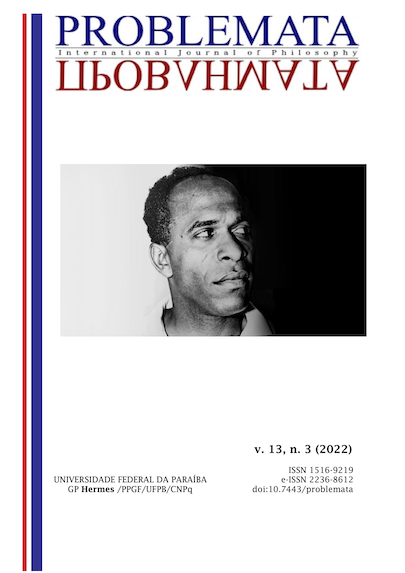HERAKLITUS OF EPHESUS IN THE MORINIAN COMPLEXITY: A PHILOSOPHY THAT AWAKENED FEELINGS
UNA FILOSOFÍA QUE DESPERTÓ SENTIRES
DOI:
https://doi.org/10.7443/problemata.v13i3.64006Keywords:
Edgar Morin, Heraclitus, You will feel, PhilosophyAbstract
In this research, some contributions of Heraclitus of Ephesus in Morinian complexity are analyzed as a philosophy that aroused feelings. We conceive it in planetary decoloniality in the transmethodical light of rhizomatic deconstruction. Framed in the line of research entitled: transepistemologies of knowledge-knowledge and transcomplex transmethodologies. To deconstruct is to decolonize, and go to a profoundly inclusive turn with the Dark One of Antiquity Heraclitus, making his contributions more complex in the light of the theory of the planetary firefly, centenary of humanity: Edgar Morín. Recovering feelings, we can study the feeling-thinking in the Morinian who inspired studies that deals with the root in a set of ideas and key phenomena to understand the physical and the biological, where repetition is also visible as replication, re-entry, restart; feedback or loop; the reorganization that leads us to review humanity in the light of the recivilization of thought, without a doubt with the ratification of Heraclitus and Morin in the middle of the technological era, egoism must be demystified, de-linked and re-linked in favor of eros. Achieving a re-linkage that re-informs the being of the human being, his goodness that is re-civilized looking for life in the lost, the devalued, the execrated.
Downloads
References
AGUILERA, Sebastián. Dios, logos y fuego en Heráclito. Byzantion nea hellás n.33: 11-27, 2014. http://dx.doi.org/10.4067/S0718-84712014000100001
CAPPELLETTI, Ángel, La Filosofía de Heráclito de Éfeso, Caracas: Monte Ávila Editores, 1969.
DELEUZE, Gilles y GUATTARI, Felix, Mille plateaux: capitalisme et schizophrénie, Paris: Minuit, 1980.
FERNÁNDEZ PÉREZ, Gustavo, Heráclito a la luz de Edgar Morín: de la complejidad de la naturaleza a la naturaleza de la complejidad, Azafea: Revista de Filosofía, v. 9, 2009, https://doi.org/10.14201/647
FERNÁNDEZ PÉREZ, Gustavo, Heráclito Naturaleza y complejidad, Sevilla: Ediciones Thémata, 2010.
GUTHRIE, W. K. C, Historia de la filosofía griega, vol. I, Gredos: Madrid, 1984.
JAEGER, W, Paideia, los ideales de la cultura griega, México D. F.: Fondo de Cultura Económica, 2006.
KOJEVE, Alexandre, Essai d'une histoire raisonnée de la philosophie paienne, París: Gallimard, 1968.
MARTÍNEZ MILLAN, Hernán, Heráclito: el Despierto, Nova tellus, v. 28, n. 1, p. 51-72, 2010.
MONTES, Ángel, Repensar a Heráclito, Madrid: Editorial Trotta, 2011.
MORÍN, Edgar, El método I: La naturaleza de la naturaleza, Madrid: Cátedra, 1981.
MORÍN, Edgar, El método III: el conocimiento del conocimiento, Madrid: Cátedra, 1994.
MORÍN, Edgar, Mis demonios, Barcelona: Kairós, 1995.
MORÍN, Edgar, Articuler les savoirs. L’Enseignement de la poésie (Textes choisis), Paris: Ministère de l’Éducation Nationale, de la Recherche et de la Technologie, 1998a.
MORÍN, Edgar, Introducción al pensamiento complejo, Barcelona: Gedisa Editorial, 1998b.
MORÍN, Edgar, Mes philosophes, París: Librairie Arthème Fayard/Pluriel, 2013.
OLMOS, Carlos, Revisitando las fuentes y conceptos fundamentales de la filosofía de Heráclito de Éfeso, Mutatis Mutandis: Revista Internacional de Filosofía, n. 6, p. 25-43, 2016.
PARÍS, Sonia, Repensar los conflictos interculturales y su transformación pacífica desde el paradigma de la complejidad de Heráclito De Éfeso, THÉMATA. Revista de Filosofía, n. 52, p. 179-197, 2015. https://doi.org/10.12795/themata.2015.i52.10
PALAZZO, Sandro, Heráclito y Parménides: El Uno y lo múltiple, Barcelona: EMSE, 2017.
PANIKKAR, Raimón. El silencio de Buddha. Una introducción al ateísmo religioso, Madrid: Ediciones Siruela, 2005.
PANIKKAR, Raimón. Colligitte Fragmenta. Por una integración de la realidad. En Panikkar, R. (2016). Obras completas VIII. Visión trinitaria y cosmoteándrica: Dios-Hombre-Cosmos (pp. 237-363), Madrid: Herder, 2016.
RODRÍGUEZ ADRADOS, Francisco. Palabras e Ideas, Madrid: Ediciones Clásicas, S.A. 1992.
RODRÍGUEZ, Milagros Elena, Deconstrucción: un transmétodo rizomático transcomplejo en la transmodernidad, Sinergias educativas, v.4, n. 2, p. 43-58, 2019a, https://doi.org/10.31876/se.v4i2.39
RODRÍGUEZ, Milagros Elena, Re-ligar como práctica emergente del pensamiento filosófico transmoderno, ORINOCO Pensamiento y Praxis, v.11, p.13-34, 2019b.
RODRÍGUEZ, Milagros Elena, Religar ecosóficamente como urgencia transepistémica en la re-civilización de la humanidad, Revista Desenvolvimento Social, v. 26, n. 1, p.169-188, 2020.
RODRÍGUEZ, Milagros Elena, La decolonialidad planetaria como apodíctica de la transcomplejidad, RECIPEB: Revista Científico-Pedagógica do Bié, v.1, n.1, p. 43-56, 2021.
SOCIEDADES BÍBLICAS UNIDAS. Santa Biblia. Caracas: Versión Reina-Valera, 1960.
SOLANA, José. Morín y Heráclito, conexiones entre sus ideas, Gazeta de Antropología, v.33, n. 2, artículo 03, 2017.
VALLEJO-GÓMEZ, Nelson. Entrevista con Edgar Morín. Disponible en: https://kipschool.org/usr_files/generic_pdf/EntrevistaMorin.pdf
Downloads
Published
Issue
Section
License
Copyright (c) 2022 Milagros Elena Rodriguez

This work is licensed under a Creative Commons Attribution 4.0 International License.
Authors who publish with this journal agree to the following terms:
- Authors retain copyright and grant the journal right of first publication with the work simultaneously licensed under a Creative Commons Attribution License that allows others to share the work with an acknowledgement of the work's authorship and initial publication in this journal.
- Authors are able to enter into separate, additional contractual arrangements for the non-exclusive distribution of the journal's published version of the work (e.g., post it to an institutional repository or publish it in a book), with an acknowledgement of its initial publication in this journal.
-
- Authors are permitted and encouraged to post their work online (e.g., in institutional repositories or on their website) prior to and during the submission process, as it can lead to productive exchanges, as well as earlier and greater citation of published work (See The Effect of Open Access).





